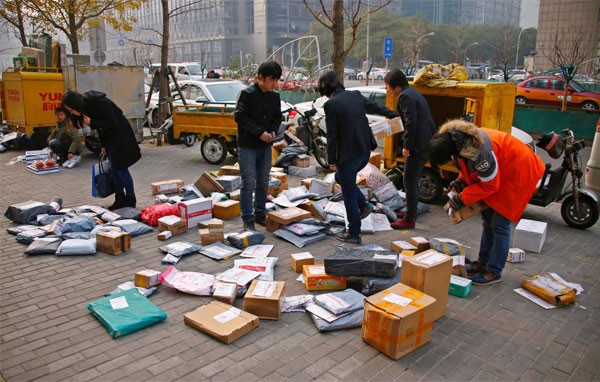With customers made up of mainly young and well-educated shoppers looking for products that are either unavailable or are expensive to buy in China, haitao has become a multibillion-dollar market and is still rapidly expanding.
Liu Xin, a 32-year-old mother from Beijing, has been purchasing products for her child from websites overseas since 2011.
From milk powders and feeding bottles to strollers and car baby seats, most of her purchases were delivered to her doorstep via international shipping.
"Every mom around me knows how to shop from overseas websites for their babies. It is now a must-have life skill," she says in an interview.
Liu is part of a fast-growing number of Chinese who buy products overseas--a practice that has become so popular it has earned the name "haitao," which means "ocean search" in Chinese.
China's total online shopping sales reached 691.41 billion yuan ($111 billion) in the third quarter of 2014, which is a 49.8-percent increase from the same period in 2013, according to industry consultancy firm iResearch. It also foresees the year's total cross-border e-commerce to rise by 30.6 percent from 2013, making up 14.8 percent of total foreign trade. In addition, the country's Ministry of Commerce also foresees cross-border trade by Chinese e-commerce companies to reach 6.5 trillion yuan ($1 billion) in 2016.
Haitao's recent momentum is attributed primarily to the Chinese government's legislators. In Aug. 2013, the State Council issued a policy supporting cross-border e-commerce containing measures that speed up processing, including customs clearance, quarantine inspection, duties and foreign exchange.
Major cities such as Shanghai and Guangzhou have also implemented designated e-commerce pilot zones where foreign goods can be stored in bonded warehouses before being cleared by customs. Guangzhou also has e-retailers that can immediately register overseas goods with customs each time a buyer makes a deal, making tariff collection and other procedures much faster.
"The easy access for the Chinese to go abroad, the popularization of the Internet, and the increasing number of purchasing channels are making Chinese buyers smarter," says Zhou Ting, head of China Fortune Character, a Chinese market research institute that specializes in luxury goods.
"Chinese consumers are no longer willing to pay brand premiums. They're seeking high-quality products at reasonable prices."
In 2013, Chinese buyers made up 47 percent of purchase of luxury products worldwide, contributing approximately 634 billion yuan ($102 billion) in sales, according to a report from China Fortune Character.
But while online shopping allows Chinese consumers a wider range of choices, analysts also advise caution when purchasing especially when done through surrogate buyers or unofficial websites.
"Knockoffs are flooding the online market, and it's difficult for customers to tell the genuine goods from fakes," said Ouyang Kun, China branch chairman for the brand management non-profit World Luxury Association. "Even if they can, there's little chance that they will get their money back."
To counter the proliferation of fake items, luxury brands such as Hermes and Louis Vuitton have set up brand inspection centers that provide technical support to the Chinese industry, commerce and law enforcement officials and to help solve disputes.





















